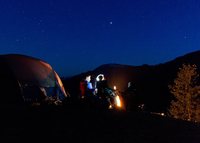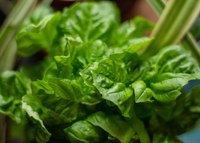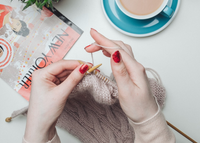We present 33 ways to avoid shopping and celebrate Buy Nothing Day
Black Friday, the day after American Thanksgiving, is typically the busiest shopping day of the year in the US. It’s also Buy Nothing Day in North America, a day of protest against consumerism. On November 26 this year, why not skip the online bargain hunting and instead do something good for the planet that’s also good for your soul?
- Cut up your credit cards—it’s a classic Buy Nothing Day activity for a reason. The ease of credit card spending often leads to overconsumption, which is bad for both the environment and your finances.
- List in a gratitude journal everything you appreciate, from the big things in life (those long-term friendships that sustain you in rough times) to the small (those comfy yoga pants that feel like a warm hug). Research shows that expressing more gratitude leads to increased happiness and reduced materialism.
- If the night sky is clear, fill a thermos with hot chocolate then bundle up for an evening of stargazing.
 Photo by Brendan Greenway on Unsplash
Photo by Brendan Greenway on Unsplash - Give an old item new life by cleaning and fixing it. If you don’t know how to do the repair, chances are there’s a helpful video online or someone in your friends-and-family network with the required skills. Around the world, the right-to-repair movement is growing. Advocates argue that all consumers should have access to the necessary information, parts and tools to repair objects they own (especially electronic ones), and that companies should design products with repair and longevity in mind.
- Teach someone a new skill.
- Create something new by upcycling materials you already have. Think cardboard, plastic containers, metal cans, wood, paper, scrap fabric and buttons. The only limit is your imagination—or the imaginations of all those clever folks on Pinterest.
- Donate an item you no longer use. You’ll stop the item from ending up in the landfill and help someone else buy used instead of new.
- Plant something edible, whether that means basil in a pot on the windowsill, carrots in a backyard or an acre of potatoes. Mycobacterium vaccae, a bacterium found in soil, has been shown to relieve stress and boost mood. Plus nothing tastes as good as food you grew yourself.
 Photo by Bonnie Kittle on Unsplash
Photo by Bonnie Kittle on Unsplash - Join (or start) a community garden, to grow produce and meet like-minded people at the same time.
- Go for a walk or a bike ride. Spending time in nature has a huge list of benefits, from lowering stress to improving mood, attention, empathy and cooperation.
- Try plogging. The term combines the Swedish words plocka upp (pick up) and jogga (jog), and it means to combine jogging with picking up garbage. All that bending and stretching adds an extra element to your physical workout.
- Eat something retrieved from deep in your freezer. If you’re feeling really ambitious, set up a simple system (using a small magnetic whiteboard, or even just a piece of paper) to track the contents of your freezer and avoid food waste in the future.
- Bake something from scratch. The internet has a cornucopia of recipes for bakers of every skill level. And if your creation skews more toward the “Pinterest fail” end of the spectrum, just remember Julia Child’s timeless advice: “With enough butter, anything is good.”
- Empty out your junk drawer. You never know what treasures you’ll find!
- Watch the 21-minute film The Story of Stuff on the internet, then borrow the book of the same name by Annie Leonard from your local library. You’ll learn about how overconsumption threatens our environment, economy and health—and you’ll end up re-examining your own relationship with “stuff.”
- Take an hour to relax with a free yoga or meditation class online.
- Join your local Buy Nothing group, then start giving away things you no longer need and asking for thing you could use—all for free. These groups are especially useful for the parents of small children who continually outgrow clothing and shoes and lose interest in their toys and books. During the pandemic, these groups have been popular with people who started doing (then giving away) jigsaw puzzles.
- Go to Reddit and read through a subreddit on buying nothing or anti-consumption.
- Clean out and organize your kitchen pantry, then donate extras or duplicates to your local food bank. And don’t automatically throw out anything past its “best by” date. According to both the US Department of Agriculture and the Canadian Food Inspection Agency, this date refers to food quality, not safety. Unopened packaged foods past their “best by” date are generally safe to eat, though they may have lost some freshness or flavour.
- Reread a favourite book from your shelf.
 Photo by Radu Marcusu on Unsplash
Photo by Radu Marcusu on Unsplash - Enjoy a DIY spa treatment by making a face mask using kitchen staples such as bananas, honey, avocados, yogurt and olive oil. Search the internet for a recipe that addresses your specific skin concerns—then try not to nibble on the ingredients.
- Start a challenge with friends to see who can go the longest without buying anything. If you’re really committed, you might attempt a no-buy year.
- Rewatch a DVD you love. You remember DVDs, right? They’re the things that came before streaming but after VHS tapes. Be sure to make a big bowl of popcorn (and remember Julia Child’s advice about butter).
- Spend a few nostalgic hours looking through old photo albums. Even better, sort through a box of old photos, scan them on the computer, and label and organize them all.
- Dig through your cupboards and drawers to find everything you need to create a zero-waste kit, to leave in your backpack or car. Some useful choices: reusable shopping bags, reusable produce bags, Mason jar or plastic container (for toting leftovers), coffee mug, water bottle, cutlery, chopsticks, reusable straw, cloth napkin, handkerchief...
- Clean out your clothes closet, and start a swap with friends.
- Borrow The Day the World Stops Shopping by J.B. MacKinnon from the library. The author examines the question of whether we can reduce consumption enough to save the environment, without destroying the economy in the process. What started as one journalist’s thought experiment (“What would happen if we all stopped shopping?”) actually came true when the COVID-19 pandemic first swept across the world.
- Phone someone you haven’t spoken to in a while.
- Organize a board game night where everyone brings their favourites to play. If your friends and family are spread out all over the place (or if pandemic restrictions in your area are still tight), then do a virtual game night instead.
- Volunteer your time to a cause you believe in. The many health benefits of volunteering include improving physical and mental health, learning new skills, finding a sense of purpose and nurturing relationships.
- Listen to your favourite old music on vinyl, cassette or CD.
- Finally finish that half-done artistic project—writing, painting, woodworking, sewing, knitting, crocheting, etc.
- Plan out an advent calendar of free eco-friendly activities to do from December 1 to 25, so you can extend the spirit of Buy Nothing Day through the entire holiday season.
 Photo by Rebecca Grant on Unsplash
Photo by Rebecca Grant on Unsplash




